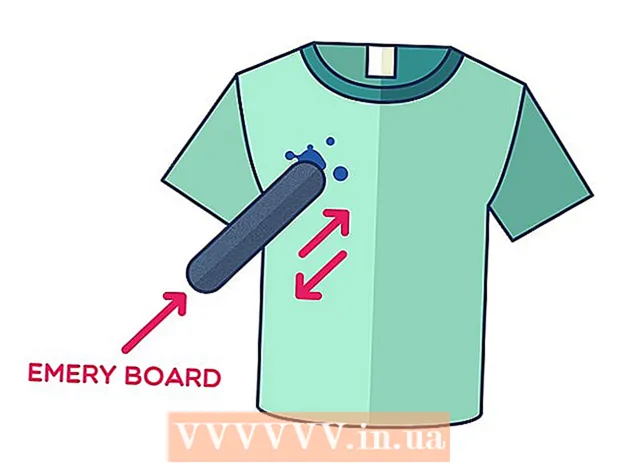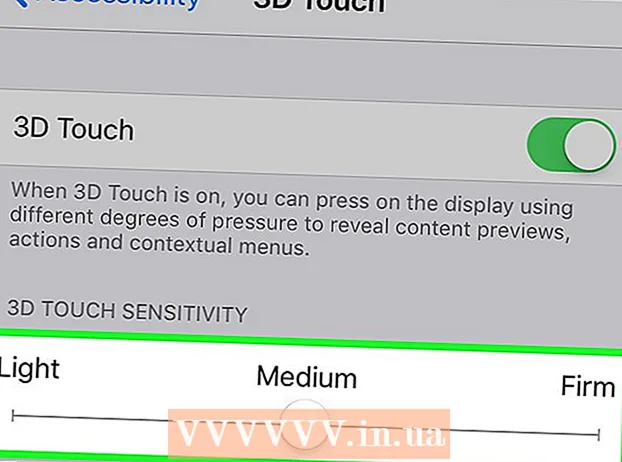Author:
William Ramirez
Date Of Creation:
20 September 2021
Update Date:
21 June 2024

Content
- Steps
- Method 1 of 3: Symptoms of Helminthic Infestation in Dogs
- Method 2 of 3: Treating helminthic infestation
- Method 3 of 3: Preventing Worms
- Tips
- Warnings
There are five main types of worms that can parasitize dogs, and they are heartworms and four types of intestinal worms (roundworms, tapeworms, hookworms, and whipworms). The local veterinarian should be well versed in local parasites, symptoms of helminthic infestation, and diagnostic and treatment methods. This article will help you recognize helminthic infestation in dogs, as well as provide recommendations for treatment. It must be remembered that helminthic infestation is difficult to diagnose when a dog is slightly infected or if the infestation has already existed for a long time.
Steps
Method 1 of 3: Symptoms of Helminthic Infestation in Dogs
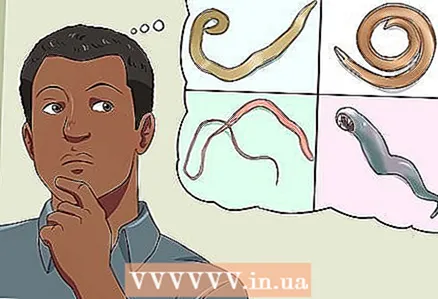 1 About worms. Roundworms, tapeworms, whipworms and hookworms can be found in a dog's gastrointestinal tract and excreted in feces. Such helminthic invasions have similar symptoms.
1 About worms. Roundworms, tapeworms, whipworms and hookworms can be found in a dog's gastrointestinal tract and excreted in feces. Such helminthic invasions have similar symptoms. - Most intestinal parasites are transmitted from one dog to another - this is called the faecal-oral transmission mechanism. The eggs of the worm are excreted in the faeces of an infected dog and enter the gastrointestinal tract of a healthy dog. Even if you can't see other dog's feces, grass and lawns may contain worm eggs. When licking paws and fur, the dog can swallow these eggs.
- Tapeworms can be transmitted to your dog by ingesting fleas.
- You will not be able to determine the type of helminthic infestation, but you can suspect it if you look for symptoms.
 2 Check your dog's feces. Intestinal worms can be detected by examining a dog's feces. Be careful in the following situations:
2 Check your dog's feces. Intestinal worms can be detected by examining a dog's feces. Be careful in the following situations: - Roundworms and whipworms cause diarrhea. If your dog has been suffering from diarrhea for a long time, see your veterinarian.
- Hookworm and whipworm can lead to blood in the stool. If you notice blood in your dog feces, see your veterinarian urgently.
- Segments of tapeworms can be seen in the feces as well as on the fur around the dog's anus. If you notice white, rice-like pellets in your dog's feces, this is a sure sign of a tapeworm infestation.
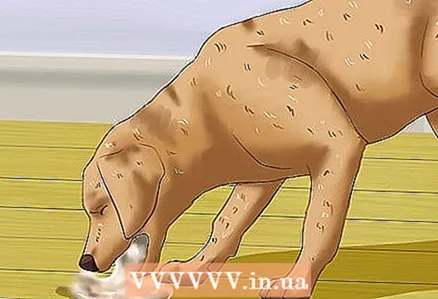 3 Vomit. Worm infestations in dogs are often accompanied by vomiting. This is especially true for round and tapeworms.
3 Vomit. Worm infestations in dogs are often accompanied by vomiting. This is especially true for round and tapeworms. 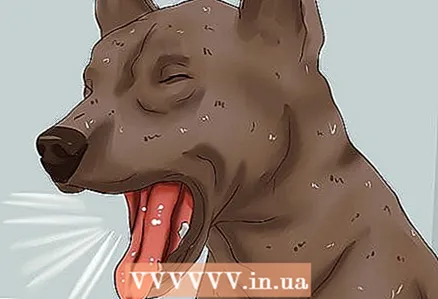 4 Cough. In some cases, a dog may have a cough against the background of a helminthic invasion. This is characteristic of roundworm infestations.
4 Cough. In some cases, a dog may have a cough against the background of a helminthic invasion. This is characteristic of roundworm infestations. - A cough can be a symptom of a large number of diseases, so you should contact your veterinarian anyway.
 5 Pay attention to the general condition of the dog. If you notice a sharp increase in the belly or weight loss in your dog, worms may be the cause of these conditions.
5 Pay attention to the general condition of the dog. If you notice a sharp increase in the belly or weight loss in your dog, worms may be the cause of these conditions. - Bloating can be a symptom of a roundworm infestation, and weight loss is a symptom of a roundworm, tapeworm and whipworm infestation.
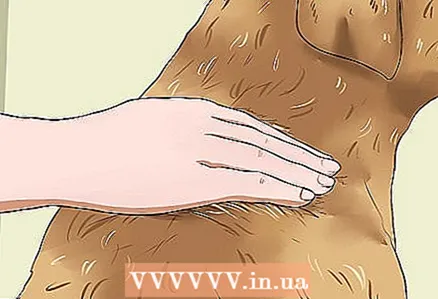 6 Pay attention to the dog's coat and skin. The condition of the skin and coat can change significantly with helminthic infestation of the dog.
6 Pay attention to the dog's coat and skin. The condition of the skin and coat can change significantly with helminthic infestation of the dog. - If the usual shine of the coat is gone, then the dog may be infected with roundworms.
- Skin irritation can be a symptom of nematode infestation.
 7 Look for excessive flatulence. If the dog starts to release more gas than usual, then this may be a manifestation of a whipworm infestation.
7 Look for excessive flatulence. If the dog starts to release more gas than usual, then this may be a manifestation of a whipworm infestation. 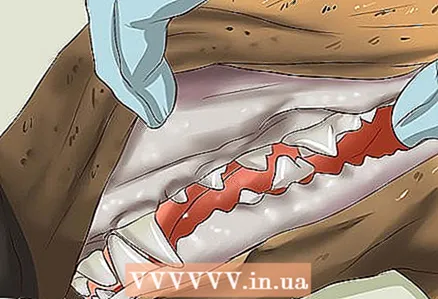 8 Signs of anemia. Since the parasites live in the intestines, they compete with the dog's body for nutrients, which can lead to iron deficiency anemia.
8 Signs of anemia. Since the parasites live in the intestines, they compete with the dog's body for nutrients, which can lead to iron deficiency anemia. - Anemia can be diagnosed by examining a dog's gums. The gums should be pink, like a person's. If the gums are pale, the dog is anemic, which may be a symptom of hookworm and whipworm infestation.
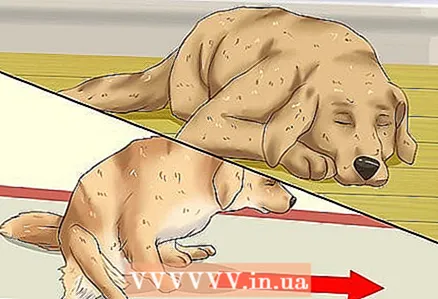 9 Monitor your dog's behavior. Intestinal parasites can alter a dog's habits. For example:
9 Monitor your dog's behavior. Intestinal parasites can alter a dog's habits. For example: - Tapeworms cause excitement, abdominal pain, and itching in the anal area, which can cause the dog to drag its back on the ground.
- Hookworm and whipworm make the dog sluggish. A sudden decrease in activity in a dog should alert the owner and prompt him to go to the veterinarian.
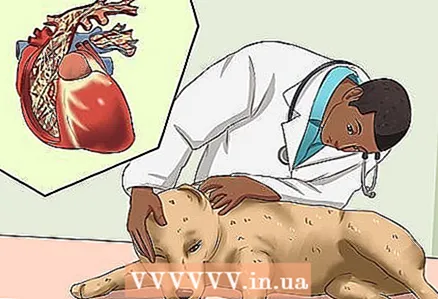 10 Check your dog regularly for heartworms. Heartworms are blood parasites that are passed from one dog to another through the bite of a mosquito. Unfortunately, unlike intestinal worm invasion, heartworm invasion does not manifest itself for a long time. Therefore, it is important to regularly donate the dog's blood for analysis.
10 Check your dog regularly for heartworms. Heartworms are blood parasites that are passed from one dog to another through the bite of a mosquito. Unfortunately, unlike intestinal worm invasion, heartworm invasion does not manifest itself for a long time. Therefore, it is important to regularly donate the dog's blood for analysis. - In most cases, an annual blood test will be sufficient to detect early heartworm infestation, and taking heartworm prophylaxis medications will make your dog healthier.
- With a strong invasion of heartworms, symptoms such as abdominal swelling, hair loss, coughing, rapid or difficult breathing, and weakness appear.
- Such symptoms appear at a late stage of infection with heartworms, when the treatment is already powerless. Therefore, it is very important to have your dog checked regularly by a professional.
Method 2 of 3: Treating helminthic infestation
 1 Collect your dog's stool for analysis. If you suspect that your dog is infected with intestinal worms, then the first step in the diagnosis will be the delivery of feces.
1 Collect your dog's stool for analysis. If you suspect that your dog is infected with intestinal worms, then the first step in the diagnosis will be the delivery of feces. - Your veterinarian will ask you to collect a stool sample at a specific time to determine what type of worms your dog is infected with.
 2 Prescribing drug treatment. Most intestinal parasites can be treated with one or more drugs. The veterinarian will prescribe the frequency of administration of the drug, depending on the type of worm.
2 Prescribing drug treatment. Most intestinal parasites can be treated with one or more drugs. The veterinarian will prescribe the frequency of administration of the drug, depending on the type of worm. - For infections with roundworms or hookworms, oral medications called "deworms" are given. After 3-6 months, in order to exclude re-infection, it is necessary to check the dog again for helminthic invasion.
- A combination of the two drugs is used to treat roundworms and hookworms, some of which are available over the counter. Products for treating roundworm and hookworm infestations such as Pirantel and Fenbendazole are available over the counter.
- Pirantel is a fairly safe product for puppies from 4 weeks of age. Check with your veterinarian before use.
- In case of infestation with roundworms or whipworms, a month's course of treatment against heartworms is necessary to exclude reinfection.
- Praziquantel and Epsiprantel are often used to treat tapeworms.
- Vlasoglav is sensitive only to certain drugs, such as fenbendazole or febantel. The course of admission is ten days with a break of three weeks. Preventive treatment for heartworms is recommended.
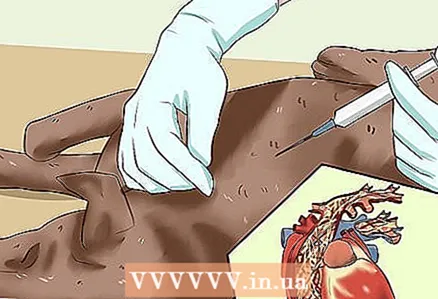 3 Start treating heartworms immediately. Dogs infected with heartworms should receive treatment as early as possible. In the late stage of heartworm infestation, veterinary supervision is necessary.
3 Start treating heartworms immediately. Dogs infected with heartworms should receive treatment as early as possible. In the late stage of heartworm infestation, veterinary supervision is necessary. - The veterinarian will assess the severity of the infection, the extent of the damage to the heart and lungs, and, depending on this, will prescribe treatment.
- There are several treatments for heartworms, ranging from 6 to 12 months. The most commonly used combination of oral drugs with intramuscular injections.
- Heartworms are a very serious infection, so some dogs will not survive even with treatment.
Method 3 of 3: Preventing Worms
 1 Check your dog regularly with your veterinarian. Regular examination by a veterinarian will allow detecting worm infestation at an early stage and prescribe timely treatment.
1 Check your dog regularly with your veterinarian. Regular examination by a veterinarian will allow detecting worm infestation at an early stage and prescribe timely treatment. - As a preventive measure, have your dog's stool tested once a year.
- Have a feces test more often if your dog spends most of the time outside the house, in contact with other dogs, hunts and eats wild animals, and if you live in an area where parasitic infections are common.
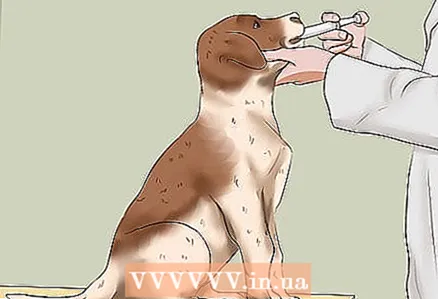 2 Prevention of heartworms. Prevention of heartworms is safer and cheaper than treatment of infestation, therefore it is necessary to start preventive courses of drugs in puppies as early as possible - before 8 months of age. Most of the drugs available to prevent infestation of heartworms also affect intestinal parasites, so they have a double benefit.
2 Prevention of heartworms. Prevention of heartworms is safer and cheaper than treatment of infestation, therefore it is necessary to start preventive courses of drugs in puppies as early as possible - before 8 months of age. Most of the drugs available to prevent infestation of heartworms also affect intestinal parasites, so they have a double benefit. - There are several courses for preventing heartworms, and your veterinarian will recommend one.
- Most drugs for the prevention of heartworms are available in oral and topical forms.
- Most heartworm prevention drugs will help get rid of fleas and ticks. Although there is no cure for all parasites, your veterinarian will prescribe the medication that works best for your dog.
- Drugs for the prevention of heartworms are prescribed for one month in the form of intramuscular injections, the effect of which lasts for 6 months. Such drugs do not help protect against intestinal parasites.
- If heartworms are not common in your area, you can use pyrantel, fenbendazole, and praziquantel to prevent and treat intestinal worms.
 3 Avoid flea infestation. Tapeworms infect your dog when fleas are ingested, so avoid infestation by fleas.
3 Avoid flea infestation. Tapeworms infect your dog when fleas are ingested, so avoid infestation by fleas. - There are over-the-counter topical and oral medications for the prevention of fleas in dogs that work effectively to combat fleas and thus tapeworm infestations.
- Anti-flea collars and bathtubs are less effective in fighting fleas.
 4 Clean your dog's bowl. Hookworms and whipworms are transmitted through dog feces. Clean your dog's feeder and keep it away from other dogs.
4 Clean your dog's bowl. Hookworms and whipworms are transmitted through dog feces. Clean your dog's feeder and keep it away from other dogs.
Tips
- Monitor your dog and contact your veterinarian for any signs of worm infestation.
- Clean your yard regularly.
- Always check with your veterinarian before giving your dog any medication.
- Check your dog every 6-12 months, including stool and blood tests.
Warnings
- In severe cases of hookworm infection, the dog may need to be hospitalized with intravenous fluids or even blood.
- If left untreated, both intestinal and heartworms can kill a dog. Keep an eye on the dog and seek professional help if there is any concern.
- Be careful when cleaning up your dog's faeces, as hookworms and roundworms can be spread from dogs to humans.
- Hookworms are passed on to newborn puppies. If your dog is pregnant, it is very important to be alert for signs of helminthic infestation.
